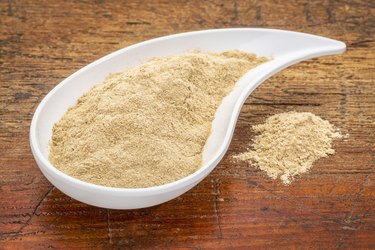
Maca is an herb that was harvested by the ancient Inca culture. Different cultures have passed down the herb over the years, in part due to its rumored ability to increase fertility and sex drive, especially in men. Recently, other positive benefits have come to light around maca, including its adaptogenic qualities. Although maca is not usually linked with weight loss per se, its healing capabilities may help to promote a decrease in weight. Talk to your doctor before adding maca to your diet.
History
Video of the Day
Maca, according to the book, "Maca: Adaptogen and Hormonal Regulator," by Beth M. Ley, was domesticated over 2,000 years ago, and was used by early cultures for its reported fertility and aphrodisiac properties. The Spanish who conquered the Inca tribes in the 1500s chronicled the benefits of maca, which helped their livestock to reproduce when they experienced the stress of the highlands. In more recent times, maca has become popular for its purported adaptogenic effects, helping to level energy under stress.
Video of the Day
Significance
Maca is known for several purported benefits, including reducing stress, boosting the immune system, and as an aphrodisiac. According to Ley, maca may also help those with chronic fatigue, and may help lower cholesterol. Because a weakened immune system, stress, chronic fatigue and high cholesterol are sometimes linked to weight gain, it is feasible that maca, through helping to heal these maladies, may promote weight loss.
Function
Maca is considered a thyroid stimulator by some alternative health experts. In the book, "The Thyroid Diet: Manage Your Metabolism for Lasting Weight Loss" by Mary J. Shomon, she notes that maca is an adaptogenic herb that can help with increasing energy in the body. This natural stimulant may speed up the metabolism, burning more calories and creating weight loss over time.
Still, there is little indication that maca, by itself, will establish a high rate of weight loss. Rather, it can help boost energy to better assist with exercise and movement.
Dosage
Maca is normally found as a powder supplement, and can be added to shakes, smoothies, or on top of cereal. According to the book, "Collins Alternative Health Guide" by Steven Bratman, the usual dosage of maca is 500 to 1,000 milligrams a day. Work with a practitioner to determine proper levels for your body.
Considerations
Bratman notes that in two reported human clinical trials, use of maca did not lead to any adverse side effects. Still, maca has not undergone comprehensive safety testing. Children, pregnant, or nursing women should not take maca unless instructed to by a licensed practitioner.